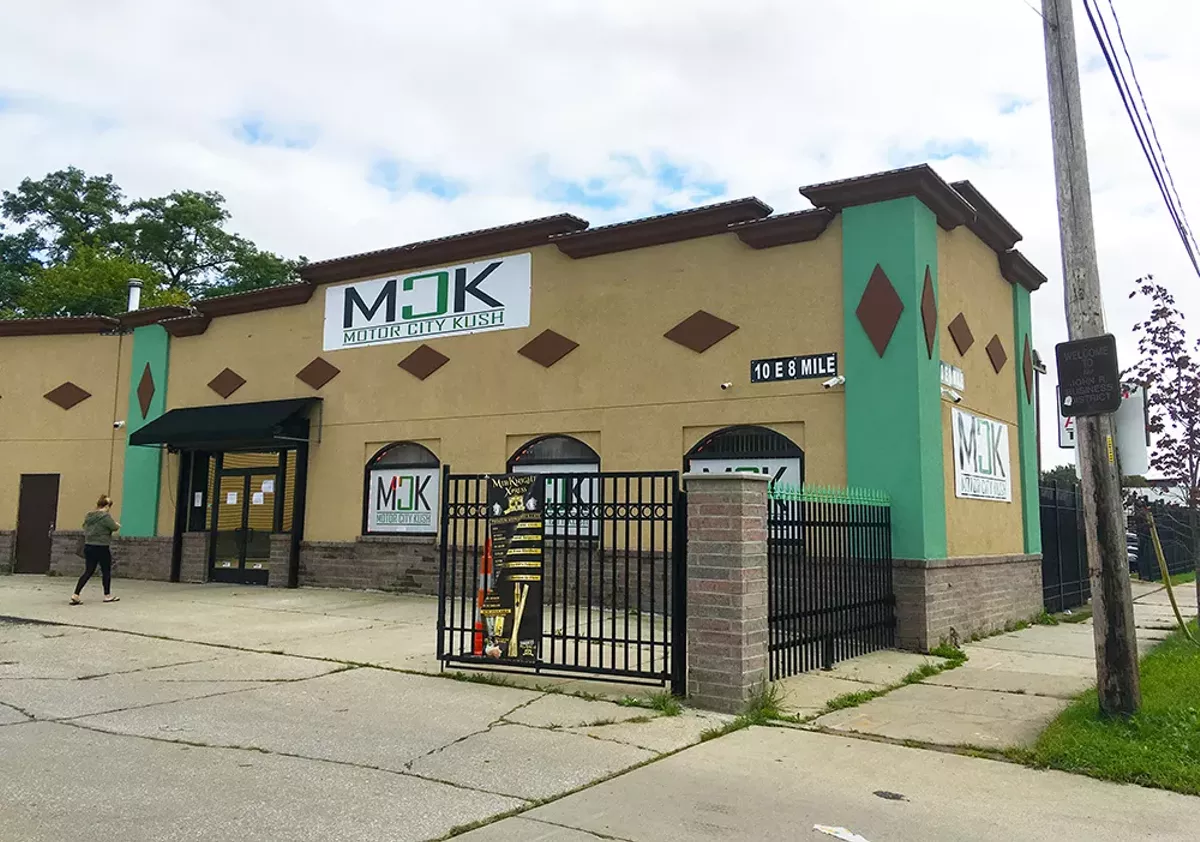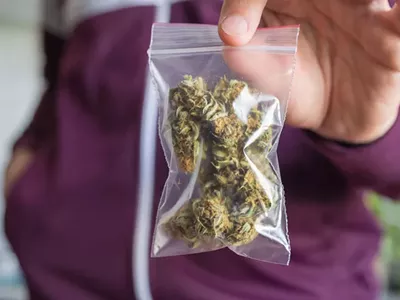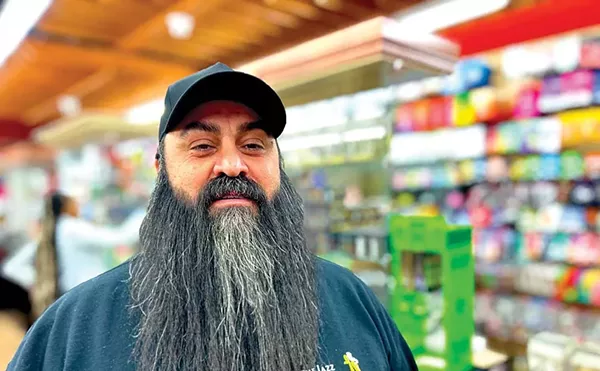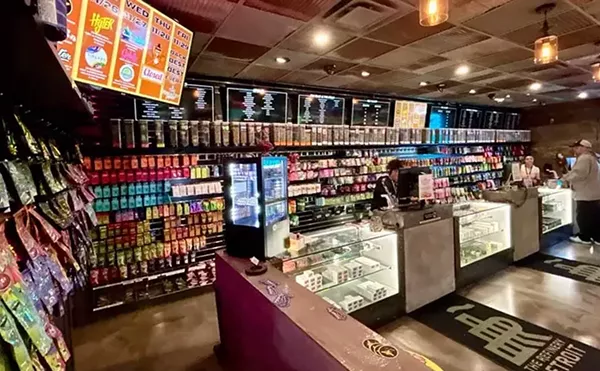

Audio By Carbonatix
[
{
"name": "GPT - Leaderboard - Inline - Content",
"component": "35519556",
"insertPoint": "5th",
"startingPoint": "3",
"requiredCountToDisplay": "3",
"maxInsertions": 100,
"adList": [
{
"adPreset": "LeaderboardInline"
}
]
}
]
With just a few more weeks until the election, things have indeed picked up on the activism scale as supporters and opponents of Proposal 1 see the goal line ahead.
It's been a long haul for pro-marijuana activists. When you stand back and consider that we're standing on the verge of voting on the legalization of marijuana, it's momentous. It's taken years of determined struggle to get to this point. A lot of people have put in a lot of efforts of many kinds to get to this point. A lot of people have been arrested and gone to jail and had their families disrupted. A lot of people have had their belongings confiscated by police. Some people have actually died — on both sides of the struggle.
A lot of people have changed their minds about marijuana along the way. More often than not that change comes when a loved one gets sick and finds that marijuana helps them.
For most intents and purposes the free marijuana movement arguably started in 1969 when poet-activist John Sinclair was sentenced to 10 years in prison for possession of two joints. It seemed an exceedingly hard sentence. The resulting "10 for 2" furor led to the John Sinclair Freedom Rally in 1971 at U-M's Crisler Arena that attracted high profile counterculture stars. John Lennon and Yoko Ono performed, as well as the emergent Stevie Wonder and Bob Seger. Poet Allen Ginsberg spoke, along with Abbie Hoffman and a young activist named Sheila Murphy — who later became Sheila Cockrel, a Detroit City Council member.
Three days later the Michigan Supreme Court declared the state marijuana laws unconstitutional in a Sinclair appeal and he was released from prison. This also left marijuana legal in Michigan for a few months before new statutes slammed and locked that door. However, that brief period of freedom spawned the Ann Arbor Hash Bash, around which much of the marijuana activism in Michigan has focused.
Sinclair was 30 in 1971 when he was released from prison. He turned 77 just a few days ago. The intervening years have witnessed a seismic shift in marijuana and all things related to it.
Along the way there have been small steps such as decriminalization in Ann Arbor in 1972 where possession was a civil infraction punishable with a $5 fine, and big steps such as medical marijuana in 2008. And there were 14 cities that decriminalized marijuana, including Detroit, Lansing, Jackson, Kalamazoo, and Grand Rapids — some of the state's largest cities — in a methodical campaign across the state. There were some places where lowest law enforcement priority ordinances were passed.
We've come a long way from where you could hardly say anything positive about marijuana when the war on drugs was launched in 1970, to this year when many of the people in Michigan are already used to voting in favor of loosening up laws regarding marijuana. It's not that big of a step from voting to decriminalize in Detroit, as we did in 2012, to voting to legalize in Michigan.
Here's how things have changed for me in that time frame. In November 1971 I was 18 and standing on the corner of John R Street and Seven Mile Road at about 11:30 p.m. one night, with my hands in the air and four police rifles pointed at me across the tops of their cars. Two of those special units, STRESS or TMUs, had swooped down on me out of nowhere. While the police patted me down searching for drugs, my knees shook and I thought that I was going to jail for sure. I had a nickel bag (a $5 amount which was about 12 grams) of marijuana in my pocket and I was sure the police would find it.
I happened to have a handkerchief in the same pocket as the nickel bag, on top. The officer patted the pocket and pulled the handkerchief up until he could see it. Then he shoved it all back down into my pocket. So I didn't get arrested or go to jail — although my knees shook for the rest of the night.
Contrast that with now. The other day I went to Motor City Kush on the corner of John R Street and Eight Mile Road (I know, 47 years and I haven't gotten very far) to make a purchase. I showed my state medical marijuana registration card, bought my product, and walked out past the security with a neat little white bag.
For me, that's the difference. Standing on a corner with the police ready to arrest you, or making a safe purchase that I can take home.
We’ve come a long way from where you could hardly say anything positive about marijuana when the war on drugs was launched in 1970.
tweet this
In the next few weeks, pro-marijuana activists are officially and unofficially spreading across the state to urge people to vote yes on Proposal 1. One high profile event that will be of particular interest is an actual public debate — or at least proselytizing in the same room — between Scott Greenlee of Healthy and Productive Michigan (against legalization) and Jeffrey Hank of the Coalition to Regulate Marijuana Like Alcohol on Oct. 15, sponsored by the Lansing Kiwanis Club, at Dublin Square, an East Lansing Irish pub.
Hank has been a fierce warrior in this struggle. He was a principal with the unsuccessful MI Legalize effort in 2016 and lately has been speaking to groups on an almost daily basis.
It's not a debate on the steps of the Capitol, but marijuana folks have been salivating for a head-to-head event where they believe logic and evidence will overwhelm the "lies of the opposition."
There is plenty of other activity. An Upper Peninsula group was recently trying to raise $1,600 to put up a billboard in support of Proposal 1. Polls show anti-marijuana sentiment strongest in the UP, so the up north contingent wants to make a statement. PBS personality Rick Steves will speak on "Why legalization is a better solution" on Wednesday, Oct. 3 at 8:30 p.m. at Rackham Amphitheater in Ann Arbor.
The media is having at it, and, at least around here, allowing pro-marijuana voices to speak. Fox 2 News' Let It Rip taped a segment last week with activists Debra Young and Steven Miller (a former police officer) facing off against the anti-marijuana voices of Randy Richardville (Republican former state senate majority leader) and law enforcement representatives.
Things seem more urgent now, and while there isn't always someone to refute a prohibitionist every time they speak, there are never enough prohibitionists to try to take you down. That's because the marijuana change has already happened. It's embedded in the culture and anyone who wants some can easily find it.
Marijuana prohibition has been a spectacular failure and it's time to admit it.
Stay on top of Detroit news and views. Sign up for our weekly issue newsletter delivered each Wednesday.






